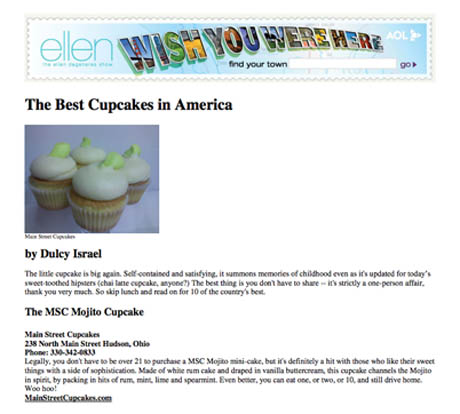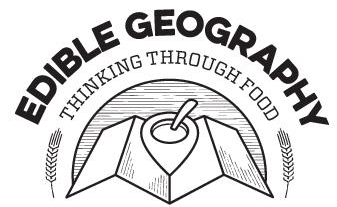In case any of you missed it, last Thursday, British intelligence proudly announced that they were behind “Operation Cupcake,” a cyberattack on the first issue of the Al-Qaeda-affiliated Inspire magazine.
IMAGE: My strangely appropriate birthday card, from the “Keep Calm” card series by bluebell 33. Thanks, Mum and Dad!
Launched last June as a quarterly pdf, the original contents of Inspire’s first issue included a message from Osama bin Laden, a prayer list of imprisoned Muslims, and a news item on the death of Mustafa al-Yazid, as well as a handy how-to feature, titled “Open Source Jihad,” which offered would-be terrorists instructions on how to send and receive encrypted messages and “make a bomb in the kitchen of your Mom”:
Can I make an effective bomb that causes damage to the enemy from ingredients available in any kitchen in the world? The answer is yes.

IMAGE: A page from the first issue of Inspire, via Public Intelligence.
At the time, journalists were divided as to their opinion of the English-language magazine’s authenticity. Writing for The Atlantic, Marc Ambinder reported that “To a lot of folks here, including our publisher, it reads almost like an Onion parody.” More suspicious minds speculated that the U.S. military had actually created the idiotic magazine itself, and distributed it under the Al-Qaeda of the Arabian Peninsula name, “in order to confuse and demoralize the enemy by subjecting it to ridicule.”
Meanwhile, it now appears, Britain’s GCHQ intelligence agency (tagline: “Keeping our society safe and successful in the internet age”) were taking the magazine seriously enough to have already sabotaged the first issue. Writing last July, Ambinder actually notes that after the first three pages, his 67-page copy of Inspire consists of “ASCII-text debris.” His source, “ActionFromTheBackSection,” explains that the gibberish was put there deliberately and comes from a file called “ellenbca.pdf”:
People who have Adobe Acrobat (not Reader) can download the pdf (and no, it has no viruses), go to any page after 3 and open Document -> Crop pages menu. In the “Margin controls” replace 0.5 inches in the “Top” and “Bottom” sections with 0 inches. You will see that what was cropped out in the pdf are the page number (bottom) and this string (top):
“C:\Users\m050\Desktop\ellenbca.pdf 29 June 2010 16:45”
Which means that the debris was put into the file deliberately, and was present in the initial file from which it was printed (“ellenbca.pdf”).
One of Ambinder’s commenters, Lee Gillentine, takes the next step — googling “ellenbca.pdf” — only to find that the offending debris corrupting Inspire’s text is nothing less a list of the top ten cupcakes in America, originally compiled by Dulcy Israel for the Ellen DeGeneres show. Featuring Carmel Apple cupcakes from Eagle, Idaho, Mojito-flavoured cupcakes from Hudson, Ohio, and a Rocky-Road variety from Charleston, South Carolina, the list is archetypal search engine-fodder:
The little cupcake is big again. Self-contained and satisfying, it summons memories of childhood even as it’s updated for today’s sweet-toothed hipsters (chai latte cupcake, anyone?) The best thing is you don’t have to share — it’s strictly a one-person affair, thank you very much. So skip lunch and read on for 10 of the country’s best.

IMAGE: “The Best Cupcakes in America,” according to Dulcy Israel.
So far, so bizarre. But the icing on the cake came nearly a year later, when nameless British officials finally took responsibility for the sabotage — “just to let them know,” as an anonymous Whitehall source told The Guardian last Thursday.
Apparently, both U.S. and British intelligence were convinced that Inspire was a genuine terrorist publication — and thus, it could be argued, a legitimate target for a cyberstrike. However, according to The Washington Post, the CIA prevented the head of U.S. Cyber Command, General Keith Alexander, from attacking the magazine, “arguing that it would expose sources and methods and disrupt an important source of intelligence.” The British clearly had no such qualms, and “Operation Cupcake” successfully disrupted the magazine for an entire fortnight:
It took almost two weeks for al-Qaeda in the Arabian Peninsula to post a corrected version, said Evan Kohlmann, senior partner at Flashpoint Global Partners, which tracks jihadi Web sites.
The story, if any part of it is true, is astonishing on several levels. First of all, from my admittedly technologically illiterate perspective, it seems a little peculiar that in an era of Stuxnet and steganography, the crème de la crème of British cyberwarriors would be content with simply swapping out offending content for “gibberish” generated by opening a pdf file in a hex editor.
But, more importantly, the choice of “The Best Cupcakes in America” as the text debris source is just too perfect: a simultaneous comment on the terrifying vapidity of online culture (the only thing missing is a cat or some Rick Astley lyrics) and the infantilising, self-indulgent, and individualistic overtones of the cupcake trend. Even if it isn’t a joke, it’s a pretty good joke.

